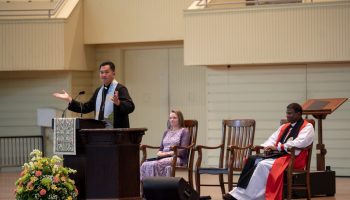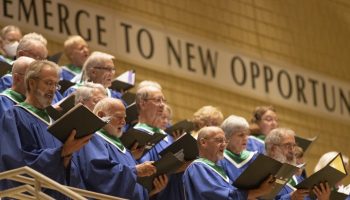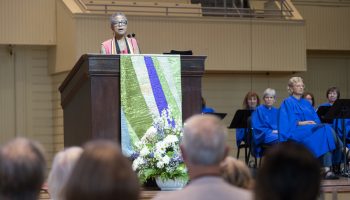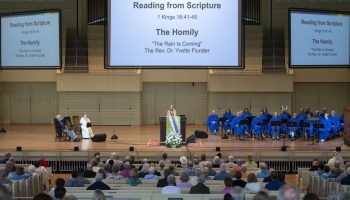
“I have a confession to make: I was out partying last night and forgot to write the sermon for today,” said Miguel A. De La Torre, tongue in cheek. “But we have all heard sermons based on the first commandment before, so you can help me write it.” His sermon title was “Remember the Sabbath,” and the Scripture reading was Exodus 20:8-11, the first commandment.
“Any good Baptist sermon has three points and a poem,” De La Torre said. “We will skip the poem, but what do these verses say? To obey God, you should keep the Sabbath. OK. You should rest because it is good for your health; you can enjoy the day and nature. OK. You can spend time with your family.”
These were all good points, he said, but “I have a question about what you heard before, because your agreement tells me how white and middle class you are.”
A preacher looks into her own life, De La Torre said, and sees how busy she is and imposes her social location on the Scripture — take a day off.
“Commentary writers look at their lives and see how busy they are,” he said. “They impose their social location on their interpretation.”
De La Torre shared a story from theologian Justo Gonzalez about a preacher whose congregation was mostly migrant workers. The preacher asked the congregation how many people had found work for four days that week. A lot of hands went up. “How many of you worked for five days,” the preacher asked. Fewer hands were raised. “How many of you worked for six days,” he continued. Only a few hands were raised.
“What does that tell us about keeping the commandments?” De La Torre asked. “It says, ‘For six days you shall work.’ In our context, having a job and an income are given. For the vast majority of the world, they have to try to find work for six days. They cannot keep the commandment.”
He continued, “We prayed this morning for the people who live at our summer and winter homes — but most have no home. We have to decolonize our minds and read Scripture from the margins.”
Most people say they read the Scripture objectively, but De La Torre said that people turn their subjective reading into an objective reading for everyone else.
“If we all read Scripture subjectively, what do we learn from an economy designed so people don’t work six days?” he asked.
De La Torre said that the value of a company’s stock goes down when unemployment goes down. Wages go up as companies seek to hire more workers.
“You need a healthy amount of unemployment to keep stock dividends up,” he said. “That is usually about 5% of the workforce. And who is that 5% who are unemployed? Black and Latino men. We need a healthy percentage of unemployed people not working six days a week for you to enjoy your retirement.”
Latino boys have the highest dropout rate in this country, De La Torre said.
“It is healthy for the economy to have under-skilled people to maintain a depressed labor market,” he said.
The first commandment was not recommending a day off, but critiques the economic structure if you read if from the margins, according to De La Torre. The minimum wage is $7.50 an hour, but De La Torre made it a generous $10 for his illustration. At $10 an hour for 40 hours a week, a worker would make $400 a week, or $20,800 a year.
“If someone worked every day, full time with no days off, they would be making less than the poverty level,” he said. “ ‘If you work hard, you will succeed’ is a myth.”
De La Torre said that the formula used to calculate the poverty level is the same one used in 1950, when there was a different understanding of the cost of living.
“If the poverty rate today was $50,000, the vast majority of this country would be living under the poverty line,” he said. “And we are the wealthiest country on earth. It is an insult to maintain these 1950 ratios.”
By reading the Bible through our own eyes, he told the congregation, “we can justify sexism and impose heterosexism. We all have verses that are our baseline, and we judge all other verses by whether they embrace or ignore the baseline verse.” For De La Torre, the verse John 10:10, to give life abundant, is his baseline.
“When God tells Joshua to kill the Canaanites, that is not giving life abundant,” he said. “If you can’t find work, that is not life abundant.”
He urged the congregation to read the parable of the vineyard owner through the eyes of the poor. The vineyard owner stopped by Home Depot and hired workers to work for the day in his vineyard. He went to a bodega and hired more workers, and when he saw others who had not found work, he hired them, too.
“At the end of the day, he paid the workers who worked eight hours the same as those who worked three hours. Is this fair?” De La Torre asked. “We have decided that time equals money. We have defined justice as the economic exchange between money and time.”
Workers and employers, De La Torre continued, have certain expectations of one another.
“As a worker, you have an obligation to show up for work; as an employer, you have an obligation to pay enough so a worker can feed himself and his family,” he said. “If a worker only gets paid for a half day, only half the family eats, and the worker does not get enough calories to work. A responsible employer enables the worker to live for one more day.”
There is no county in the United States where the “working poor” can afford to live without living with many other people, or get a proper meal without the help of social services.
“Remember the Sabbath,” De La Torre said, “ ‘Working poor’ is blasphemous and perverts keeping God’s commandments.”
The Rev. Susan McKee presided. The Rev. Paul Burkhart, retired professor of speech and theater arts at Shippensburg University, and a member of the Motet and Chautauqua Choirs, read the Scripture. The Motet Choir sang “The Prayers I Make” for the introit and “With What Shall I Come Before the Lord?” as the anthem; both were written by Jane Marshall. Jared Jacobsen, organist and coordinator of worship and sacred music, directed the Choir. Braille worship books and hymnals are available at Gate 4, the Ralph C. Sheldon Foundation Gate. The John William Tyrrell Endowment for Religion and the Daney-Holden Chaplaincy Fund provide support for this week’s services.





